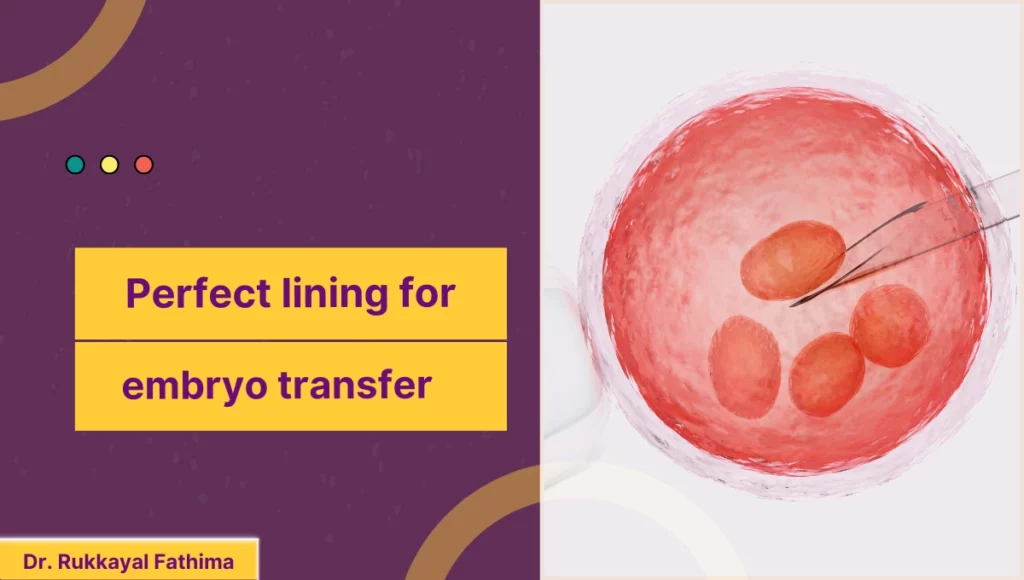Among the various factors that determine the success rate of your embryo transfer, your uterine lining is among the top determiners.
The uterine lining, also called the endometrial lining, is where the fertilized egg or embryo will implant and develop into a baby. Your uterine lining should be at an optimum thickness to implant the embryo and nourish it with the necessary nutrients until childbirth.
In this article, you will get to know the perfect uterine lining, steps to optimize it, and some factors that can potentially impact your uterine lining. Read till the end to learn about all of them.
What Is The Perfect Lining For Embryo Transfer?
The thickness of your uterine lining will change during your ovulation cycle. Before ovulation, during the follicular phase, your lining will be thin and keep growing. This is mainly due to increased estrogen production.
After ovulation, during the luteal phase, the progesterone will make your endometrium thick enough to implant the incoming fertilized egg. If there is no fertilization, progesterone levels will decrease, causing the endometrium to deteriorate and wait to be expelled during menstruation.
According to most fertility doctors, the ideal endometrial thickness is at least 7–8 mm. The lining should also have a trilaminar appearance, that is, a triple-line pattern (three layers) on an ultrasound. The lining should also have sufficient blood flow to support the implanted embryo.
Note: A thick endometrium is good for embryo transfer. However, if it is too thick, like more than 14 mm, it might be counterproductive and not give the desired results.
Steps To Optimize Your Uterine Lining For Embryo Transfer
You don’t need to worry if you have a thin uterine lining. There are some nutrients and healthy activities that can help optimize your uterine lining for embryo transfer. Below are some of the most common ones.
Sufficient Vitamin E
Vitamin E has been known to optimize the female uterine lining and help with implantation after embryo transfer. It is an antioxidant that can reduce oxidative stress, thus preventing endometrial cell damage.
It can also increase the amount of blood flow to the endometrium, making it develop well and provide a nourishing environment to the embryo.
L-Arginine
L-arginine is an amino acid that is essential for making proteins in the body. It can help relax blood vessels and improve blood flow to the uterus, thus helping deliver more oxygen and nutrients to the lining. It has also been shown to help thicken the endometrium in some women.
Acupuncture
Acupuncture involves inserting tiny needles into various pressure points and giving specific benefits to the body. Regarding uterine lining, acupuncture can improve blood flow to the uterus and ovaries. It also helps regulate hormones.
Acupuncture also reduces stress and makes you feel more relaxed, creating a favorable environment for implantation and baby development.
Factors Affecting The Lining
There are also some factors that can affect your uterine lining and decrease pregnancy chances. Get them treated and improve your uterine lining before undergoing embryo transfer.
Hormonal Imbalances
As discussed above, your hormones play a significant role in your endometrial thickness. Hormonal imbalances can disrupt the development of the lining and affect the pregnancy success rate.
Underlying Medical Conditions
Underlying medical conditions, like endometriosis, adenomyosis, luteal phase defect, etc., can affect your uterine lining. Diagnose and treat them before embryo transfer.
Lifestyle Habits
An unhealthy lifestyle is a major cause of infertility. They can affect your egg & sperm quality and also affect your endometrial lining. Ensure you follow a healthy lifestyle before, during, and after your fertility treatment.
Conclusion
A perfect uterine lining is essential to ensure successful implantation and a high pregnancy rate after embryo transfer. If you experience an IVF failure, a thin endometrium might be one of the reasons.
Ensure you get your endometrium checked and bring it to the best condition before embryo transfer. Consult with your fertility doctor and understand what measures you can take to ensure a thicker uterine lining and good implantation rates.
According to most fertility doctors, the ideal endometrial thickness is at least 7–8 mm. The lining should also have a trilaminar appearance, that is, a triple-line pattern (three layers) on an ultrasound. The lining should also have sufficient blood flow to support the implanted embryo.
The ideal endometrial thickness for a higher success rate after embryo transfer is at least 7–8 mm.
Your IVF success rate will decrease if you have an endometrial thickness of less than 7 mm. A successful pregnancy is even possible with a 6 mm thick endometrium, but the chances of success are lower.
The speed at which your endometrium thickens depends on various factors like the phase of your menstrual cycle and the average thickness of your endometrial lining. You can consult your doctor and understand any issues with your menstrual cycle.





